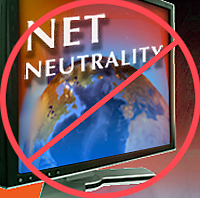By CFIF Staff
Monday, January 01 2007 |
|
What are the unintended consequences of Net Neutrality?
- Net Neutrality would stifle much-needed private investment, at a time when policymakers should promote policies that encourage further investment and job creation. Broadband providers are investing billions of dollars in critical communications infrastructure to deploy advanced networks at a rapid pace, but so-called “Net Neutrality” legislation would diminish incentives to invest. In addition to stifling investment incentives, Net Neutrality could hinder public safety and homeland security, degrade the quality of consumers’ online experience, limit competition, and kill network innovation.
Is Net Neutrality a free speech protection?
- No. Net Neutrality is essentially the “Fairness Doctrine” for the Internet. Advocates on the Left mischaracterize the debate for political gain, but Net neutrality legislation is about mandating common carrier, nondiscrimination regulations for Internet service providers, not about protecting free speech. Net Neutrality is a key pillar in the information commons, anti-property rights and wealth redistribution agenda of the far Left. Supporters of Net Neutrality believe that all Internet infrastructure and online content should constitute public property – owned, operated and run by government bureaucrats.
What are some examples of real life consequences of Net Neutrality?
- Everyone who has a broadband connection will experience more congestion and increased service interruptions if providers are restricted in managing traffic on their networks. Consumers will also pay higher prices to get online (a de facto tax), notice a decline in service options, and have far fewer choices online. Net Neutrality will prohibit consumer-oriented services, such as video on demand, and stifle innovations in services that we cannot even envision today.
- Net Neutrality will also slow down and prohibit several critical health information technology applications. For example, Net Neutrality would require that data sent over the Internet to a doctor in a large city using an advanced telemedicine application to remotely monitor a patient with a heart condition in a rural town be treated the same as all other traffic online. Simply put, Net Neutrality regulations would strip networks of the ability to prioritize lifesaving medical information as it travels over the Internet, meaning your EKG results may get slowed down and degraded because the kid next door is downloading movies or a bad actor is flooding the network with SPAM.
to view the pdf click here.
|

























